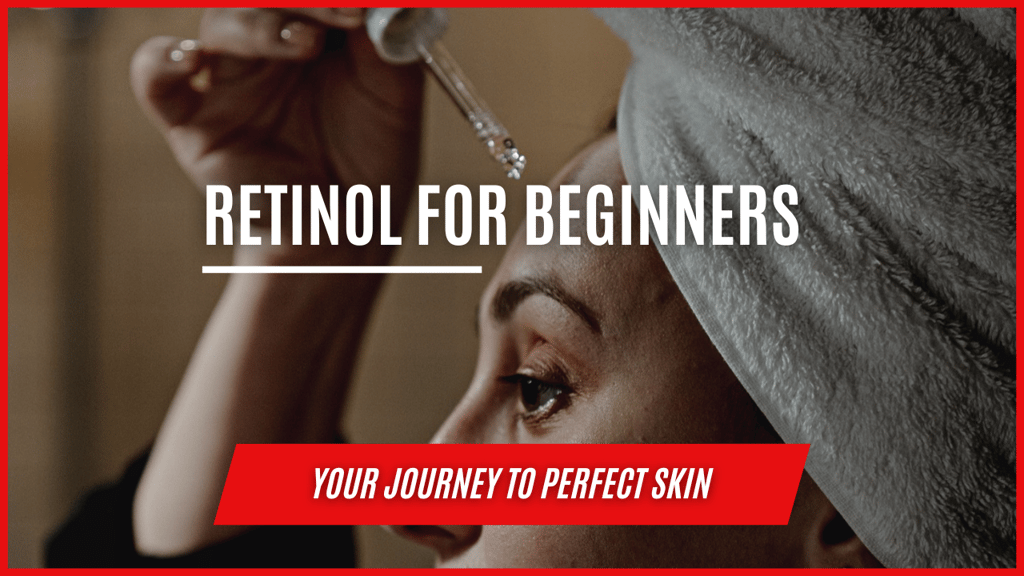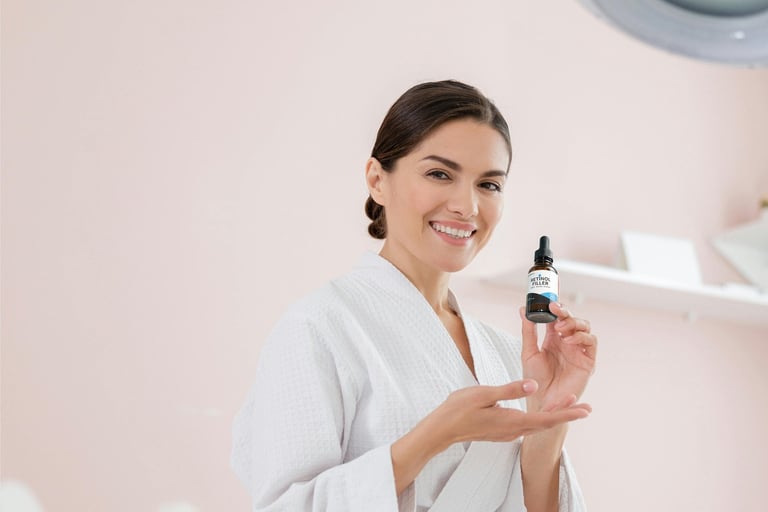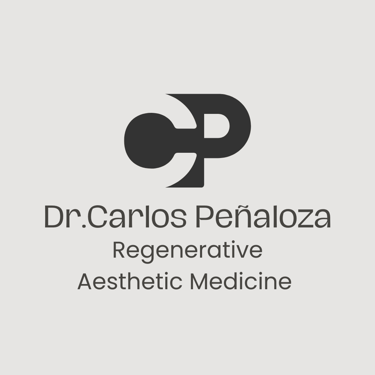Retinol for beginners. Discover the ideal product to start your journey toward perfect skin
TOP POST
Dr. Carlos Peñaloza
1/20/2025


Introduction
The world of skincare can feel overwhelming, especially when it comes to ingredients like retinol. As a doctor specializing in aesthetic medicine, I often get questions about retinol, so I wanted to share my insights with you.
What is retinol?
Retinol is a form of vitamin A found in many skincare products. It's a true workhorse when it comes to addressing various skin concerns, from fine lines and wrinkles to acne and uneven skin tone.
Benefits of retinol for the skin
Retinol offers a remarkable range of benefits for your skin:
Reduces Wrinkles: Retinol stimulates collagen production, the building block of your skin. This helps plump up the skin, minimizing the appearance of fine lines and wrinkles, even those pesky crow's feet.
Improves Texture: By increasing cell turnover, retinol helps shed dead skin cells, revealing smoother, softer, and more radiant skin.
Minimizes Pores: Enlarged pores can be a real concern. Retinol helps unclog pores and refine their appearance, leaving your skin looking more even-toned.
Fights Age Spots: Sun damage and other factors can lead to the formation of age spots. Retinol helps fade these spots by promoting the turnover of pigmented skin cells.
Controls Acne: Retinol helps regulate oil production, preventing clogged pores and reducing breakouts.
Who can use retinol?
Retinol use is available for almost all skin types, although it is important to take a few factors into account before incorporating it into your skin care routine.
Is it suitable for all skin types?
Dry skin: Retinol can be beneficial for dry skin, but it's important to make sure you keep it adequately hydrated.
Oily skin: Retinol can help control excess oil and reduce acne breakouts in oily skin.
Sensitive skin: Those with sensitive skin should use caution when using retinol and start with lower concentrations to avoid potential irritation
Are there contraindications for its use?
While retinol is generally safe for most people, there are some contraindications to be aware of. Pregnant or lactating women should avoid use. Additionally, those who have experienced adverse reactions to retinol in the past should consult a dermatologist before starting to use it again.
The basics you should know before starting
Before you start using retinol in your skincare routine, it's important to keep a few basics in mind.
When to start using retinol?
When to Start: While there's no one-size-fits-all answer, many dermatologists recommend incorporating retinol into your skincare routine in your late 20s or early 30s as a preventative measure against signs of aging.
Introducing Retinol into Your Routine: Start with a very low concentration of retinol, such as 0.25% or even 0.1%. Apply it once or twice a week initially, gradually increasing the frequency as your skin tolerates it.
Choosing the Right Product: Look for products specifically formulated for beginners with lower concentrations of retinol. Consider retinoids like retinol esters (retinyl palmitate, retinyl acetate) which are generally milder.
What to expect when using retinol?
Before you start using retinol, it is important to be prepared for the possible side effects and the time it may take to notice visible results.
Common side effects
Some common side effects when using retinol include skin dryness, redness, and irritation. These effects are usually temporary and can be managed appropriately.
Time to notice visible results
Visible results when using retinol may vary from person to person, but it generally takes at least a few weeks to notice a difference in the appearance of your skin.
Possible adverse reactions and how to manage them
In some cases, retinol use can cause more serious adverse reactions, such as excessive peeling or increased sensitivity. In these cases, it is recommended to reduce the frequency of use or consult a dermatologist for additional guidance.
Retinol skin care routine
When incorporating retinol into your skin care routine, it is important to follow some guidelines to ensure its effectiveness and minimize possible irritation.
Proper cleaning before application
Before applying retinol, it is important to clean the skin well to remove any impurities and allow better absorption of the product.
Order and frequency of application
Retinol is usually applied at night, after cleansing and toning the skin. It is recommended to start with an application twice a week and gradually increase the frequency according to skin tolerance.
Use of sun protection during the day
Retinol can increase the skin's sensitivity to the sun, so it is important to use adequate sun protection during the day to prevent sun damage and maximize the benefits of retinol.
Different presentation forms of retinol
Retinol is available in various forms of presentation on the market. Here we present some of the most common options:
Cream
Retinol creams are a popular choice due to their ease of application and ability to provide additional hydration to the skin.
Serum
Retinol serums are lighter in texture and absorb quickly into the skin. They are ideal for those who prefer a lightweight feel in their skincare routine.
Oil
Retinol oils are very nourishing and absorb quickly into the skin. They are ideal for dry and dehydrated skin.
Encapsulated retinol
Encapsulated retinol is a more stabilized form of the ingredient and may be gentler on the skin. It is a good option for those with sensitive skin.
Other options available on the market
Apart from the mentioned forms, there are also other options available in the market such as retinol patches and combination products that contain retinol along with other beneficial ingredients for the skin.
Retinol and other ingredients in cosmetics
Retinol can be combined with other skin-beneficial ingredients to further enhance its effects. Here are some ingredients commonly used along with retinol:
Hyaluronic Acid
Hyaluronic acid is known for its ability to deeply hydrate the skin and retain moisture. Combining it with retinol can help maintain skin hydration, especially for those with dry skin.
Antioxidants
Antioxidants, such as vitamin C and vitamin E, help protect skin against free radicals and environmental damage. Combining them with retinol can provide additional protection and improve overall results.
Peptides
Peptides are key ingredients in collagen stimulation and can enhance the effects of retinol on the skin, helping to keep it firm and youthful.
Myths and facts about retinol
As it has gained popularity, retinol has also been the subject of several myths. It is important to clear up some of the common myths and provide accurate information about retinol use.
Does retinol thin the skin?
Contrary to popular belief, retinol does not thin the skin. Rather, it stimulates collagen production, resulting in firmer, more elastic skin.
Should retinol be avoided during pregnancy?
The use of retinol during pregnancy should be avoided as it can be harmful to the development of the fetus. It is advisable to consult a doctor before using any product during pregnancy.
Is it true that retinol always causes irritation?
While it is true that retinol can cause irritation in some people, this does not always happen. Starting with a low concentration and gradually increasing the frequency of use can help minimize irritation.
Natural alternatives to retinol
If you prefer a more natural option, there are natural ingredients that can help promote healthy skin in a similar way to retinol.
Benefits of natural ingredients
Natural ingredients may provide skin benefits such as texture improvement, wrinkle reduction, and collagen stimulation similar to retinol.
Natural ingredients that promote healthy skin
While retinol is a potent ingredient, there are some natural alternatives that may offer similar benefits:
Bakuchiol: Bakuchiol is a plant-based alternative to retinol that shows promise in reducing wrinkles and improving skin texture.
Rosehip Oil: Rosehip oil is rich in antioxidants and may help improve skin tone and texture.
Green Tea Extract: Green tea extract has antioxidant and anti-inflammatory properties that can benefit the skin.
Final recommendations for beginners
Consult with a Dermatologist: If you have any concerns about using retinol or are unsure which product is right for you, consult with a dermatologist for personalized guidance.
Patch Test: Before applying retinol to your entire face, perform a patch test on a small area of skin to check for any adverse reactions.
Listen to Your Skin: Pay attention to how your skin reacts to retinol. If you experience excessive irritation, reduce the frequency of use or discontinue use temporarily.
Patience and consistency in the use of retinol
Retinol can take time to show visible results, so it is important to be patient and consistent in its use. The long-term benefits will be worth the wait.
Conclusions
Retinol is a powerful and effective skin care ingredient, but starting to use it can be intimidating. With this guide, we hope we have provided you with clear and useful information to start your journey towards perfect retinol skin. Remember to consult a dermatologist and be consistent in your routine to obtain the best results. Enjoy more radiant and healthy skin!


Reach Out
All rights reserved since 2024
